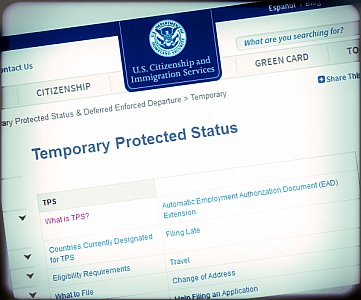
I am all for the termination of Temporary Protected Status for various populations, such as those from Central America, but suggest that we create a silver parachute for the returnees, not only to ease their return, but to soften the terms of the debate.
We will be told about how the returning TPS beneficiaries will be separated from their families; tossed out into the cold, cold world; forced to return to poverty-stricken nations where the gangs are powerful; and the like.
That those returning have had a decade or more of legal presence in this country that they would not have had otherwise will never be mentioned. That the policy was a mistake from the start will never be discussed. That most of those in the program were originally illegal aliens — nothing about that, of course.
All we will hear is that it is heartless to break up these families.
So, in order to ease the return of the TPS people, and to modify the terms of the debate, I propose a multi-part, silver parachute for the returnees. There will be some up-front costs for the government, but these will be more than outweighed by the savings over the years realized by the departure of what is a relatively low-human capital population that would be quite dependent on government programs were that group to stay in the States.
The silver parachute (SP hereafter) will have several components, all designed to ease the return of this population. These will include:
- Free air travel to the home country for all TPS beneficiaries and their immediate families (whether the family members are TPS people or not); also bus fare from the airport to the home city or village; paid for by the U.S. government.
- An advance payment of $200 a head drawn against the SP funds described below, given to them as they step off the plane in the home county.
- Other payments made to them, against the same SP funds, six months after return, with the money transfers to be made under secure circumstances in U.S. embassies and consulates.
- Another payment, from the same funds, perhaps 15 months after their return.
- A final payment, perhaps 24 months after the return.
- In return for these payments, the TPS people will agree not to seek admission to the United States, under any circumstances, for a period of 20 years.
- For the home countries, a $250 per child payment to country's school system upon the arrival of each child at the local school. This to come from USAID funds, or other moneys not directly related to the families; these payments would be for TPS children and U.S.-citizen children of TPS parents. There would be another $250 payment if the child were in school a year after arrival. That much of this money may be wasted is not the point; it will be a gesture to the community to which the TPS people will be returning.
- Social Security retirement and dependent and survivor (but not disability) benefit payments will be available to those who qualify just as if they were still in the United States, except that the retirement payments will be enhanced by $200 a month by the Social Security system to further encourage the use of the silver parachute. A life-long boost to Social Security payments would be a big selling point for the program among the older beneficiaries.
The formula for the SP payments will favor those who treated the United States appropriately while they were here. It will consist, primarily, of a refund of all the DHS fees that the TPS people paid while in the United States. This will be a considerable supply of money for those who have been in the country the longest, as every 18 months or so they have had to renew their TPS status. The amount of the fees paid by the families varies, but the main one, paid every 18 months, was $410 for the renewal of an employment authorization document (EAD). There were other fees, sometimes waived for the old and the young, sometimes just charged once, for initial applications, continuing applications, biometric fees, and the like, at prices such as $50, $85, and $160.
Another source of SP payments would be any as-yet-unpaid income tax refunds for 2017, and all federal deductions on all earnings in 2018 and 2019, many of these for partial years. (A minor benefit for the returnees would be that they would not have to file full income tax returns for 2018 or 2019.)
The $200-a-head payment on the arrival in the home country would be made in all cases, even when the SP funds described above were insufficient to cover them.
We should avoid a one-time payment for leaving for obvious reasons; spreading out the initial benefits for two years, and for the Social Security benefits for perhaps decades, is designed to keep people in their home countries.
That the United States would offer to pay for the entire family's trip to the homeland would mean that it could no longer be accused of "breaking up families". The families would make the decision as to whether they stayed together — by accepting the silver parachutes. It would be the families' option whether or not they were going to live in the same nation with each other.
The offer of the silver parachute package of benefits would be good for a limited length of time, and afterwards it would be withdrawn. It would indicate that we are not only a country of laws, we are a country of compassion.
And it would make selling the termination of TPS that much easier.
